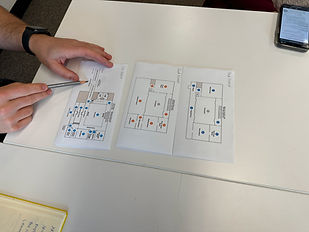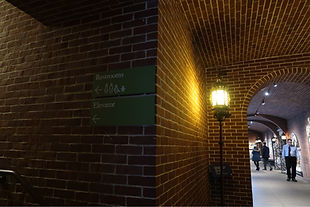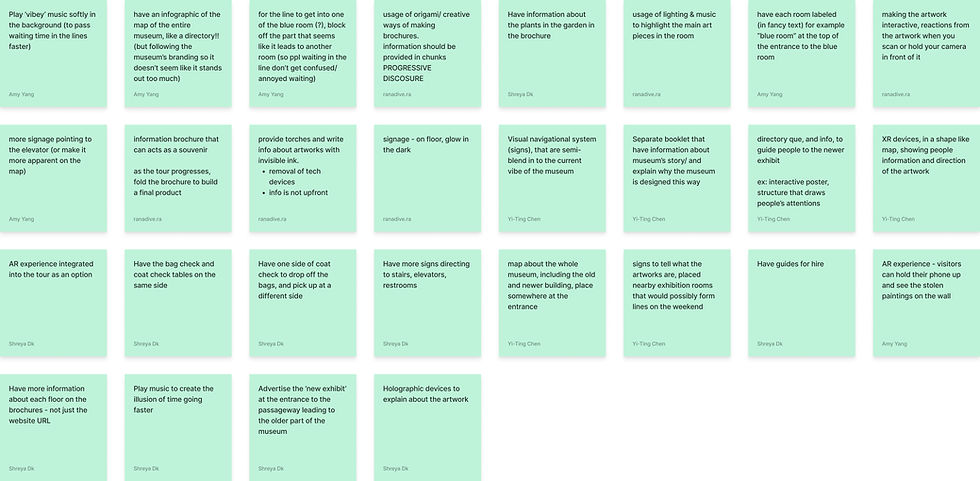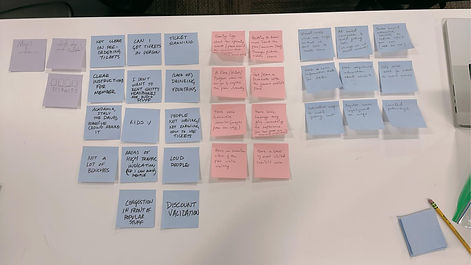
Gardner Museum
Enhancing the waiting experience
TL;DR
5 potential interventions with varying levels of feasibility that enhance the waiting experience at a museum
Observational Research
Interviews
Service Design
Spacial Design
How might we create an intuitive and seamless online shopping experience?
Research
What is the Isabella Stewart Gardner Museum?
The Isabella Stewart Gardner Museum (IGSM) offers a one of a kind experience as it is curated very differently from museums in general. It is the brainchild of Mrs Gardner herself and is filled with artifacts she collected on her travels. It houses a wide range of pieces such as paintings, sculptures, tapestries, and decorative arts.
The museum has a courtyard at the center which is as much (or even more) of an attraction than the artwork itself. The plants in the courtyard are also carefully curated and maintained seasonally.



Research Goals
When defining research goals, it's essential to acknowledge that individuals often possess deeper insights into their own problems.
#1
What drives individuals to visit museums and how do they choose which ones to explore?
#2
What factors contribute to the quality of a museum experience, distinguishing positive from negative aspects?
#3
Do visitors have specific expectations when planning museum visits?
#4
How do individuals assess what is worth waiting for during their museum visits?
Research Approach
We engaged in 8 intercept interviews (5-10min) right at the heart of the action - at the museum itself, to grasp the patrons' spontaneous reactions and immediate takeaways.
We also conducted 3 immersive long-form interviews (45min) incorporating activities like 'a day in the life', ‘image sorting’ and 'map tracing'. This allowed us to dig deeper into the patrons' experience at the Gardner Museum.

A Day in the Life
Interviewees used visual illustrations to walk us through how the museum visit fit into their day.

Image Sorting
Interviewees sorted out different activities at the museum in order of priority.

Map Tracing
Interviewees talked us through the path they took while they were at the museum and how they experienced it.
Insights
Upon reflecting on these interviews using affinity mapping, we noticed the emergence of 3 main themes.

Waiting for information
Patrons are kept waiting for information. Visitors enjoy the displays however they seem to “crave” information.

Waiting to navigate
Patrons like stumbling upon things, but they’d like to be able to locate the stairs and the restroom easily.

Waiting in queues
People come prepared to wait and are willing to wait a short while another person views and enjoys the artwork.
Ideation
Brainstorming
Drawing from our insights, we embarked on a rapid-fire 10-minute brainstorming session, unleashing any idea that crossed our minds, no matter how unconventional.

Ideation with Volunteers
To gain a fresh perspective on our insights, we conducted a brief ideation session involving four volunteers.


Rapid Sketching
After gathering diverse ideas and perspectives, we condensed them into a few actionable interventions. To enhance team communication, we participated in rapid sketching, dedicating a minute each to visually represent our approach to the intervention.

Interventions
#1
Bag and Coat Check
After entering the space, you may purchase tickets if you haven’t booked them online. Then, you’re guided to the bag and coat check counters. Currently, the two counters are arranged with the bag check on the opposite of the walkway from the coat check that is further down.
We propose to shift the bag check counter from the left side to the right side so that the direction of the flow remains consistent. We also propose to have a separate line for checking your coat and picking it up, as it is currently a single line and it can get very long and chaotic.

#2
Music
To enhance the conventional waiting experience of standing in queues to enter different rooms, we've introduced some soothing ambient music that seamlessly blends with the medieval to 19th-century eras of the rooms throughout the museum. If this were to be implemented, each room would have music tailored to represent the time period and region the paintings and artifacts came from.
#3
Brochure
One of the insights concluded from our research is that people want to learn more about the museum, whether it’s about specific artwork, history, or the general experience, but have a hard time finding those resources. This act of waiting for more information adds a layer of frustration to the museum experience.
We've developed two types of brochures. The first is a redesigned general brochure including an overall museum map, floor plans, artwork locations, and guidance on utilizing both museum resources. The brochure features tabs for easy navigation. The second is detailed floor-specific brochures, available at designated bins on each floor.

#4
Augmented Reality
We thought it would be powerful to show the possibilities of the museum experience through new emerging technology, namely AR or Augmented Reality.

We propose creating interactive AR exhibits for the stolen artworks. Visitors would use their cameras to reveal the missing paintings when pointed at the empty frames. This immersive experience offers a captivating way to engage with the absent masterpieces and highlights their significance in the museum's history.

We can offer artwork descriptions, artist bios, and historical context via AR accessed on visitors' phones. When held up to the artwork, the descriptions appear. Research shows while some enjoy the absence of descriptions as Mrs. Gardner intended, many desire them. By providing it as an optional feature, we cater to both preferences.

In the courtyard, visitors can use their cameras to learn about the plants and flowers. Just point and discover details like origin and plant family. This interactive feature adds depth to the visitor experience, enhancing their appreciation of the botanical wonders.

We suggest implementing AR technology to create guided pathways for easier navigation within the museum. Virtual arrows and contextual information displayed on visitors' devices simplify exploration, enhancing the overall experience and engagement with exhibits.

We propose enhancing the AR experience by offering AR goggles for purchase with museum tickets. These goggles provide a hands-free experience and have the same features as the mobile AR experience like viewing stolen artwork, accessing descriptions of paintings and plants, and guided navigation.

We’ve also included an additional feature of a hologram of the layout of the palace. We’ve chosen AR goggles specifically as they are see-through, so visitors will still be able to enjoy the authentic museum experience, as they would viewing with their natural eyes, and we can also avoid a safety hazard.
#5
Visual Navigation
Visitors often struggle to locate bathrooms and elevators due to signage visibility issues caused by inadequate lighting or contrast with darker walls. While maintaining visual consistency, we aim to implement subtle yet effective changes to improve navigation efficiency.

We redesigned the bathroom signage to become shorter and stick out from the wall to be more visible to the visitors.

Lastly, larger maps that represent the full view of the museums will be implanted at multiple locations in the museum.
"A great deal of thought and creativity is seen in your interventions and solutions"
- Tiffany York | Assistant Director (Isabella Stewart Gardner Museum)

Yi-Ting Chen
Amy Yang
Shreya Deepak Kumar
Rahi Ranadive
